Enterlude of detraction, light judgment, verity, and justice
Historical Records
Print fragment
Fragments from 2 leaves (E1 and E3) survive at the Huntington Library:
Anon., [Enterlude of detraction, light judgment, verity, and justice], [London : S.n., ca. 1550], RB 131401:11 (fragment).
(Reproduced by permission of the Huntington Library, San Marino, California.)
The ordering of the fragments below follows Katharine Pantzer's conjectural reconstruction (typescript and MS notes accompanying the fragments at the Huntington, made in October 1973):
| sig.E1r | sig.E1v | |
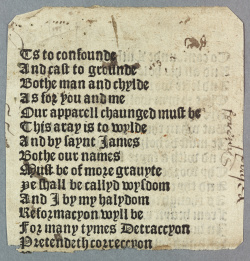 |
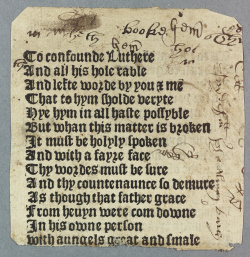
| |
 |

| |
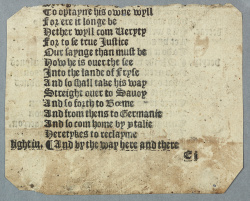 |
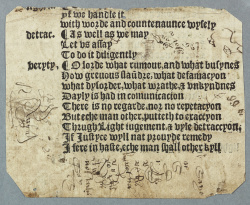
| |
| sig.E3r | sig.E3v | |
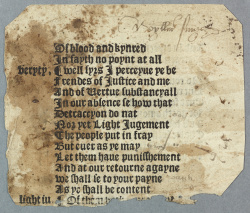 |
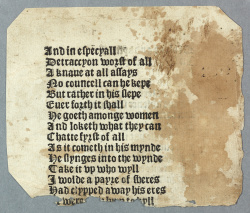
| |
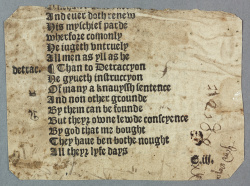 |
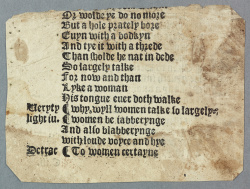
| |
Transcription
E1 leaf:
Ts to confounde And cast to grounde Bothe man and chylde As for you and me Our apparrell chaunged must be This aray is to wylde And by saynt James Bothe our names Must be of more grauyte Ye shall be callyd wysdom And I by my halydom Reformacyon wyll be For many tymes Detraccyon Pretendeth correccyon By sad dyreccyon To refourme yll And yet there is but dissymulacyon To optayne his owne wyll For ere it longe be Hether wyll com Veryty For to se true Justice Our saynge than must be How he is ouer the see Into the lande of Fryse And so shall take his way Streight ouer to Sauoy And so forth to Boeme And from thens to Germanie And so com home by Ytalie Heretykes to reclayme light iu. ¶And by the way here and there Ei
To confounde Luthere And all his hole rable And lefte worde by you & me That to hym sholde veryte Hye hym in all haste possyble But whan this matter is broken It must be holyly spoken And with a fayre face Thy wordes must be sure And they countenaunce so demure As though that father grace From heuyn were com downe In his owne person With angels great and smale Detrac. ¶How cum in our chamberere That we apparellyd were one bryngeth Accordynge to our tale them aparell. light iu. ¶ Yf we handle it with worde and countenaunce wysely detrac. ¶As well as we may Let vs assay To do it diligently veryty, ¶ O lorde what rumour, and what busynes How greuous slaūdre, what defamacyon what dysorder, what wrathe, & vnkyndnes Dayly is had in comunicacion There is no regarde, nor no repetacyon But each man other, putteth to exaccyon Thrugh Light iudgement, & vyle detraccyon. If Justyce wyll nat prouyde remedy I fere in haste, eche man shall other kyll [E1v]
E3 leaf:
Of blood and kynred In fayth no poynt at all veryty, ¶Well syrs I perceyue ye be Frendes of Justice and me And of Vertue substancyall In our absence se how that Detraccyon do nat Nor yet Light Judgement The people put in fray But euer as ye may Let them haue punisshement And at our retourne agayne we shall se to your payne As ye shall be content light iu. ¶Of them And euer doth renew His myschief parde wherfore comonly He iudgeth vntruly All men as yll as he detrac. ¶Than to Detraccyon He gyueth instruccyon Of many a knauyssh sentence And non other grounde By them can be founde But theyr owne lewde conscyence By god that me bought They haue ben bothe nought All theyr lyfe days E.iij.
And in especyall Detraccyon worst of all A knaue at all assays No councell can he kepe Buth rather in his slepe Euer forth it shall He goeth amonge women And loketh what they can Chatte fyrst of all As it cometh in his mynde He slynges into the wynde Take it vp who wyll I wolde a payre of sheres Had clypped away his eres It were hym to kyll Or wolde ye do no more But a hole prately bore Euyn with a bodkyn And tye it with a threde Than sholde he nat in dede So largely talke For now and than Lyke a woman His tonge euer doth walke Veryty ¶ why, wyll women talke so largely? light iu. ¶ women be iabbergynge And also blabberynge with loude voyce and hye detrac ¶ To women certayne [E3v]
Theatrical Provenance
Unknown.
Probable Genre(s)
Moral (Wiggins).
Possible Narrative and Dramatic Sources or Analogues
(Information welcome).
References to the Play
None known.
Critical Commentary
See Wiggins 208, who notes that "[t]he vices are Catholic, swear by St James, and are critical of heresy in general and Luther in particular; it follows that the play is of Protestant origin and more likely to be Edwardian, when there was greater official toleration of Lutheranism".
For What It's Worth
Until now, it has only been possible to access this printed fragment in person at the Huntington. As Wiggins notes (Lost Plays, 276n), "The item microfilmed under the fragment’s STC number for the UMI STC Microfilms project was a different dramatic fragment, STC 14109.5, which is also held at the Huntington and was presumably supplied in error". The erroneously microfilmed fragment is what currently displays in EEBO when a search is conducted for STC 14109.2.
Works Cited
Site created and maintained by David McInnis, University of Melbourne; updated 29 Feb 2016.